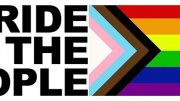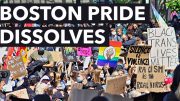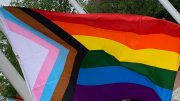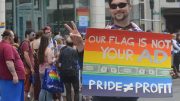
Sylvain Bruni talks Boston Pride, his other commitments, his favorite BP moments, and why he came to the U.S., among many other things.
Photo: TRT/Alex Mancini
By: Nicole Lashomb/Editor-in-Chief—
Since 2004, Sylvain Bruni has been an integral part of New England’s Largest LGBT Pride celebration and organization, Boston Pride. When former president, Linda DeMarco decided to step down from her long-held position to move into the Vice Presidential role this year, it only made sense that Bruni would lead. According to DeMarco, the Board of Directors “could not have chosen anyone more qualified” to serve as her successor.
In this exclusive TRT interview with Bruni, he shares his perspective on Boston Pride, not merely the 10-day celebration, but as a vast reaching organization, even into the world of politics to forward the rights, struggles and visibility of the LGBT community across the region and beyond.
The Rainbow Times: You’ve been involved with Boston Pride since 2004, ultimately leading to a seat on the Board of Directors, also overseeing multiple events and supervising the organization’s information technology, security and communication divisions. How have these responsibilities helped to prepare you to lead the largest Pride organization in New England?
Sylvain Bruni: Having been a volunteer for Boston Pride for many years, then an event chair on the committee and then a board member has allowed me to understand the logistical intricacies and inter-dependencies that impact the success of the Boston Pride celebration. In my view, it is paramount that the leadership in an organization truly experiences what and how work is being performed by the various members they lead. Consequently, having first-hand experience of what it means, for example, to install toilets at a festival, to greet guests at the entrance of a party, to organize the parade line-up, or to negotiate contracts with entertainment agencies gives me a full appreciation not only of what I can ask of members of Boston Pride, but also of potential operational and programmatic improvements.
Q. What has been your most proud Pride moment to date?
A. I can recount many proud moments, but I would place at the top of the list the first Boston Pride Parade that I coordinated, and my combined interview of Jason Collins, Joe Kennedy, and Barney Frank in last year’ parade.
When I was coordinating my first parade, I was stressed out of my mind, trying to make sure that the porta-potties were set up in the right location, that the crowd control volunteers had their safety vests on, that registration and line-up were progressing smoothly, that no gap was forming between groups during the march, and so on. I was just so absorbed in the logistics of the event that initially I didn’t step back to look at the marchers and the crowds. But when I did, about mid-way in the parade on Charles street, I realized that thousands and thousands of marchers and parade watchers were there enjoying the day and free to be who they are in a safe space, I realized that this was my and my team’s doing. We had put on this huge event! And people were liking it! It was a huge success and a personal pride.
The interview with Jason Collins, Joe Kennedy and Barney Frank was a totally different story. As the interviewer on the parade grounds for the BNN broadcast of the event, I was trying to spot marchers whom I wanted to interview – a careful balancing act between choosing representatives from the community, non-profit organizations, businesses, our Pride partners and sponsors, volunteers, and elected officials or candidates. And when the three of them came within range, together, this was a moment made-for-TV, a historic opportunity for Boston Pride to record on tape how important this moment was. The first openly gay NBA player with a pioneering gay member of Congress, with his successor in the House, newly elected U.S. Rep. Joe Kennedy, all three marching for equality and visibility. I was extremely proud to be on the Boston Pride team that made that moment possible.
Q. This year there was a major uproar over open LGBT participation being denied in the traditional South Boston St. Patrick’s Day Parade, making significant headlines in both LGBT media and mainstream media alike. Boston Pride, decided to participate in the Veterans for Peace St. Patrick’s Peace parade instead, to protest this discrimination. Why was this an important decision for the organization? What message were you hoping to send the community?
A. This was the third year that Boston Pride marched in the St Patrick’s Peace Parade. It was very important for us that the LGBT community be represented in the Peace Parade by a strong and well known organization. Our job at Boston Pride is to make our community visible, to provide a platform for any organization or individual to affirm themselves, their identities, freely and openly. The Allied War Veterans Council, the organizers of the traditional parade, stand completely in opposition to this: they want LGBT people to hide who they are, to go back into the closet. For years, Veterans for Peace has been a strong ally organization to the LGBT community: they stand for the equality of LGBT folks and our open participation in the St. Patrick’s celebration. Therefore, when they invited us back to the Peace Parade, accepting their invitation was just the right thing to do. By participating in the Peace Parade, we sent the message that LGBT people won’t be silenced or hidden; we will remain visible. We’re here, we’re queer, get used to it! I’ll just add that we shouldn’t forget how Boston Pride also developed out of the anti-Vietnam War movement. So our struggles and movements have been linked for almost 45 years!
Q. As president, other than putting together the annual Boston Pride celebration, what other initiatives will you undertake?
A. Boston Pride will continue to produce year-round activities, like Latin@ Pride, the Holiday Event, and our open houses. Right now, my focus is to ensure that Pride Week is the most successful it’s ever been. In fact, I already have my eyes on 2015, when Boston Pride will be celebrating 45 years of bringing our community together!
Q. What is a fun fact about you that not many people know?
A. I came to the United States because I wanted to become an astronaut and go to Mars!
Q. Former president Linda DeMarco said that the Board “could not have chosen anyone more qualified” to be her successor. Having such longevity as Boston Pride’s president, what did that statement mean to you? What did you learn from her during her tenure?
A. Linda’s statement meant a lot to me, indeed. She’s been a model and a mentor for me. Although we have vastly different personalities, we do think alike and are 99% of the time on the same page when it comes to Pride. She taught me the mechanics of the City and of the State and educated me about the history of Boston Pride as an organization. Her mentorship was invaluable: to know where to go, you have to know where you come from!
Q. You’re also very involved with InterPride and in 2012 served as co-chair for the annual conference held that year. You still serve as co-chair of InterPride’s communications committee. Why is being such an active member important to you personally and professionally?
A. Being an active member of the community is important to me because I believe that everyone should contribute to it. It’s about participating proactively in shaping what our community is to become, without necessarily expecting to gain personally from it. I believe that I, along with my colleagues at Boston Pride, have skills that help to fulfill a necessary function in our community: organizing our annual Pride celebration and providing visibility to LGBT people. This is a very “engineering-oriented” view of my involvement, and that’s my professional bias. I won’t lie, though: I immensely enjoy being involved with Boston Pride and InterPride. I get to meet a lot of wonderful people, who contribute in extraordinary ways to our communities around the world. Working with them and providing them with the tools and means to increase their visibility is a great personal satisfaction.
Beyond that, just like many folks in the community, I first felt like I was part of “a” community when I attended Pride in Paris over a decade ago. So it’s only natural now that I pay this experience forward. As we say at Boston Pride, “it’s always someone’s first Pride”… so we need to make damn sure that it’s a great one! (laughs).
Q. How has Boston Pride evolved since 2007?
A. In the period 2007-2013, Boston Pride has focused on investment and growth. We invested in infrastructure (e.g., long-term lease of office space, IT hardware and software) and in event production logistics (e.g., equipment, signage) to ensure a medium-term decrease of our operational costs. This was a necessary step to control our expenses as the size of our programming was increasing: attendance at the parade, festival and block parties has grown tremendously over the last few years; many events have been added to the Pride calendar; and our participation in human rights activities and InterPride has increased. So we have become a much bigger organization. Yet, we’re still entirely run by volunteers, so we had to adapt some of our business practices.
Beyond these operational considerations, Boston Pride has taken many steps, since 2007, to reach out to all parts of the community, in order to ensure that no one feels disenfranchised. We took the responsibility to plan Latin@ Pride when the previous organizing committee folded, and we jumped in to plan Youth Pride when its organizing committee needed assistance. We’ve changed the way the theme and marshals are selected for Pride Week, so that the community gets to decide (through online suggestions, nominations, or votes). We’ve made a conscious effort to reach out to the Trans community, and to the Bi community. We’ve developed partnerships or working relationships with many organizations, including those representing LGBT seniors, our straight allies, and communities of faith. Ultimately, we’ve continued to embrace the diversity within our community, to guarantee that Pride celebrations are reflective of our community.
Q. You are very involved in the community other than your role for Boston Pride. You currently serve on MIT’s LGBT alumni group, Fenway Health’s Young Leaders Council, HRC Partners and the French American Chamber of Commerce in New England’s Young Professionals Committee. Who or what is your inspiration to continue the type of work you do?
A. As I mentioned earlier, I believe that everyone should contribute in one way or another to the community. So, as long as I can afford it physically and financially, I’ll continue to participate in or donate to these organizations. Apart from that, I’d say that I’m a very curious person: I want to know and to discover as much as possible while I can—and being involved in community organizations (whether it is in the LGBT community or the French community) is a means to achieve that.
Q. What do you think are the most pressing issues for the LGBT community? How will Boston Pride help to eradicate these issues?
A. There are obviously many issues that are pressing, and I couldn’t rank them by priority—they are all important, and all deserve our attention: combating racism and biphobia within our community, fighting for employment non-discrimination or gender identity/expression non-discrimination, assuring access to healthcare for everyone, resolving LGBT youth homelessness and bullying, supporting LGBT seniors and bridging generational divides, ensuring proper media representation of our community, etc. Our mission at Boston Pride is to guarantee that our community’s issues receive attention: we are here to provide a platform to those individuals and organizations that focus on each one of these issues (and all the other ones!), so they can broadcast their message to the whole community and to the world.
Q. Complete the following sentence using some or all of the following words … hottie, serious, twinkie, bears, youth, seniors, parties, lesbian, gay, transgender, butch, femme.
A. Boston Pride is for everyone: twinkies and bears, youths and seniors, lesbian and gay, bisexual and transgender, butch and femme… and everyone else!
Q. What is your biggest hope for Pride 2014?
A. No rain…Shoot, I just said the “r-word!” On a more serious note, I hope that people download our app—it’s free—and visit our website at bostonpride.org, because the PrideLine gets overloaded very quickly in May and June (smiles). Obviously, I also hope that everything runs as smoothly as possible and that our community enjoys the celebration!
Q. If you could pick 3 words to describe yourself, what would they be?
A. Proud, French, Cat-lover
Q. What 3 words would your friends or partner use to describe you?
Smart, Straight-shooter, hard-working
Q. What is your biggest hope for the LGBT community in 2014? Any predictions?
A. My hope is that we continue to press for the passage of progressive legislation that addresses the abovementioned issues, at the local, national, and international levels. And, of course, record turnout at Pride, because we need to show the broader New England community that we exist and that we matter!
Boston Pride 2014 takes place from June 6-16 in Boston, Mass. To stay up to date on the latest developments of Pride 2014, checking in frequently at www.bostonpride.org, download their app, or call the Pride hotline at 617-262-9405.







